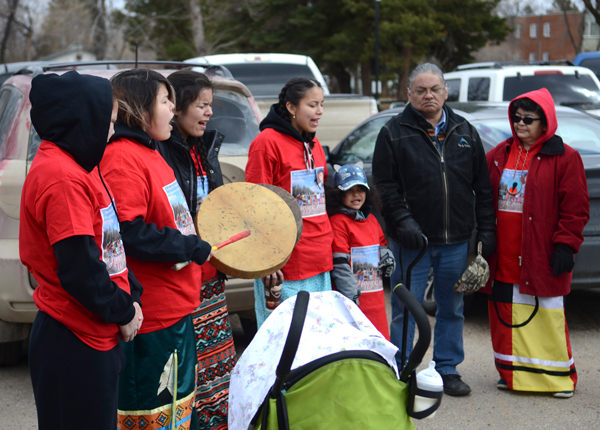
Monday’s report on the high number of missing and murdered Indigenous women and girls (MMIWG) was a welcome development for Regina Poitras, even if it was a bit late.
Poitras’ daughter Happy Charles hasn’t been seen since she disappeared while in Prince Albert on April 3, 2017. In the week that followed, Poitras and her family canvased the city while looking for any information on her daughter’s whereabouts.
She’s glad to see the issue of missing and murdered Indigenous women get some national attention, even if it didn’t come as soon as she’d hoped.
“Now at least it’s out in the open,” Poitras said during an interview on Monday. “Now they’ve actually said that there is that problem.”
Poitras and her family plastered the city with posters in the weeks following Charles’ disappearance. They visited homeless shelters, medical and addiction clinics, needle exchanges and called police departments, prisons and hospitals, all in the hope that they’d find some clue. More than two years later, they’d had little success to show for those efforts.
Poitras said it was a difficult for the family having to do a lot of that initial legwork on their own. She wonders how things would have changed if people had taken their concerns seriously right from the start. That’s a problem she hopes the report can address.
“To have that support (is vital), no matter who it is,” she said. “Me and my husband were talking about that.”
While there is a lot of optimism in Prince Albert following the report’s release, many local activists say it’s vital to follow up on those recommendations.
Shirley Henderson, the chairperson for the Prince Albert Grand Council Women’s Commission, said she’s long thought police in Prince Albert do not take the issue seriously enough. She worries they wait too long to start searches or investigations, and aren’t active enough, especially when it comes to missing person files. This report has renewed her commitment to see that change.
“I’m hoping that we can turn things around with our police here in the city of Prince Albert,” Henderson said. “I have requested a meeting, and now I will push even further to have this meeting with the police chief and the vice-chief of Prince Albert city police. We need to address this. We can’t put in the closet any longer.”
It’s been 15 years since the PAGC started hosting an annual missing brothers and sisters memorial walk. Henderson says that shows just how long the disappearance of Indigenous people has been an issue. She’s glad to see some action on a national level, but wonders why it took so long in the first place.
“It started 15 years ago and it took this long for the government to take action and do something,” she said. “I mean, we knew at the time to do something about this.”
Prince Albert Police Service Chief Jon Bergen was unavailable for comment on Monday. A spokesperson with the police service said he was travelling, but would be available for comment later in the week.
The Saskatchewan Association of Chiefs of Police (SACP) did release a statement however, acknowledging that change needs to happen.
“One of the principles of policing is that, to be effective, police must have the consent of the people and to get that consent, there must be trust,” SACP president and City of Weyburn police chief Marlo Pritchard said in a media release. “The National Inquiry has, yet again, demonstrated that we have failed to build the necessary trust with Indigenous, Metis and Inuit peoples, especially the women. Until everyone—no matter their race, religion or sexual orientation—have trust they will be treated fairly and equally by police, we have much work to do. We have to do better!”
While there was plenty of positive responses to the report, there were some criticisms.
Poitras said she was disappointed with the cost of the inquiry, which was supposed to deliver its findings in November 2018. Instead, it received a six-month extension in June of that year. Commissioner Michele Audette even considered quitting after the government declined to give them a two-year extension, which would have cost an additional $50-million.
“I don’t agree with how much money was spent, but then that’s a different story,” Poitras explained. “Some of that could have been spent searching. That’s where we lacked a lot. Travelling all that way … to go search, that took a big toll on us.”
